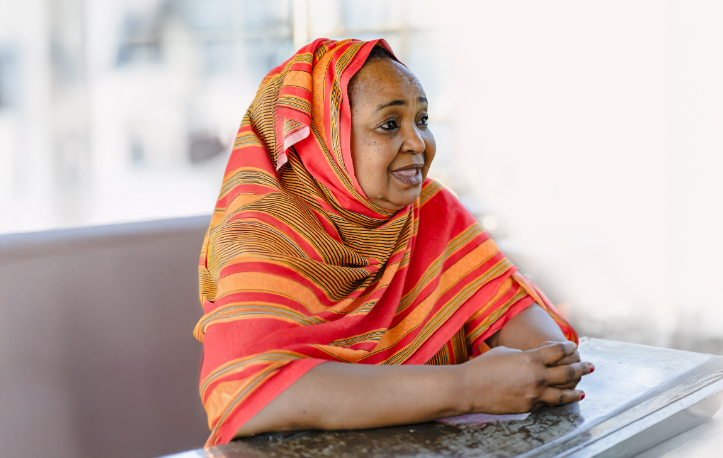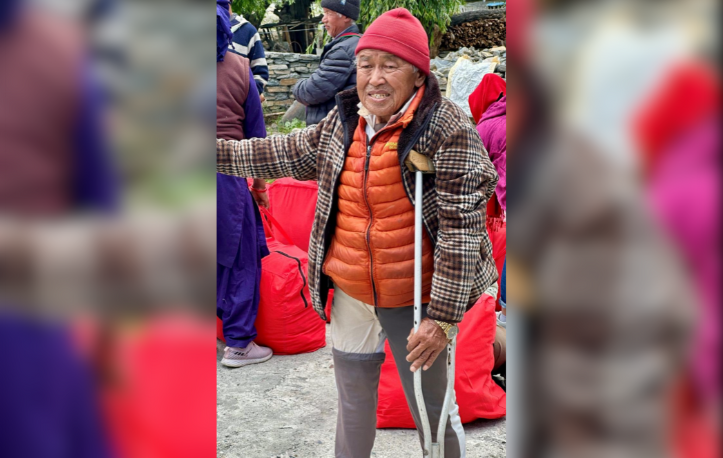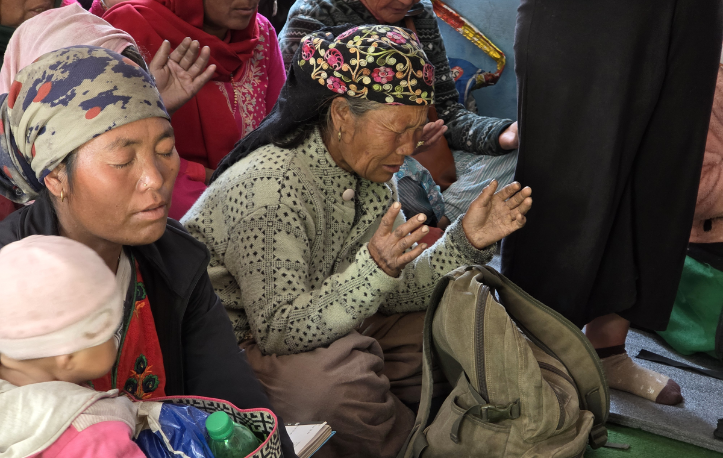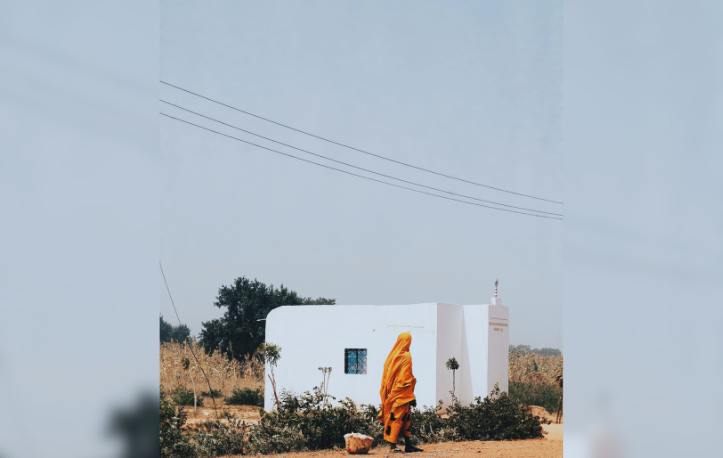If Halima had known she was walking into a church, she would not have entered. “When they saw my dress was the Islamic style, they were shocked,” she said of the Christians inside. Then she gave them an even bigger surprise. While still wearing her hijab, an Islamic head covering for women, she raised her hand when the pastor asked if anyone was interested in knowing Christ. “I was the first Somali woman to accept Christ in that church,” she said. Halima’s husband, Bekele, a communist and former army colonel, also came to know Christ that day.
Halima’s extended Muslim family included well-known Somali political and Islamic leaders. One was a member of parliament and another was a leader of the clan to which the country’s president belonged. Her family’s connections to power, however, were not always an advantage.
When Halima was a young girl, her family was forced to flee the country after civil war erupted in the 1980s. “There was a big target on us because we belonged to the clan of the leader,” Halima said. For years, armed rebel groups engaged in combat with government forces, eventually overthrowing the ruling military junta. Intermittent clan-based fighting as well as attacks by the Islamic extremist group al-Shabaab continue today.
Halima grew up as a refugee in a neighbouring country, and her family was assisted by numerous aid groups over the years. So when a pastor who had been sharing the gospel with her husband picked them up one Sunday morning and took them to a building with a fluorescent cross on it, she thought they were going to a Red Cross centre.
But once inside, the pastor’s message touched her heart. “He was talking about the fight between Jacob and Esau,” she recalled. Halima had heard of Yaqub (Jacob) from the Koran, which she had studied all her life, but she had never heard his story the way the pastor told it that day.
“I thought he was talking about my life,” she said. “The fight in Somalia was just between the family members. He was talking about the journey and how Jacob went into the desert and was sleeping on the stones. I was weeping because I identified myself in this.”
Though Halima had a limited understanding of the local language, she said God helped her understand everything the pastor said. “I never heard such a story in the Koran or anywhere,” she said. “I was weeping, and my husband was surprised that I was crying. I thought that everybody who came to that congregation was a displaced person like me.”
After responding to the pastor’s message, Halima and Bekele remained at the church for several days to receive instruction in the basics of the Christian faith. “We loved the teaching,” Halima said. As someone who had grown up devoted to Islam, she said it took time and the work of the Holy Spirit to affirm her faith in Jesus Christ as the Son of God.
Before long, she was telling others about Christ. “I just started sharing the gospel with other people, even before being baptised,” she said. Her extended family was shocked by her conversion and how it had changed her. When she visited her ailing father at the family home, her brother attacked her for sharing her Christian faith with his daughter. He even fired a handgun at Halima, prompting her to escape through a window. “I refused [to return to Islam] and stood firm in my faith,” she said.
Most Somalis believe that to be Somali is to be Muslim. Those who leave Islam to follow Christ are considered betrayers of their religion, nationality and family. “It is very difficult to leave that close clan community,” she said.
Tragedy and Reasons to Sing
Over time, Halima and Bekele received baptism, further instruction in the faith and ministry training. In the year 2000, the couple was invited to attend a training course for Christian leaders in Nigeria. When they arrived at the airport for their flight in January, however, Halima was denied permission to travel. Despite their protests, Bekele had to go without her.
Then, two days later, she received terrible news. Shortly after takeoff from a stopover in Ivory Coast, the aeroplane on which Bekele was travelling had plunged into the Atlantic Ocean, killing him and 168 others on board. Halima travelled to Ivory Coast to identify her husband’s body. “It was a very difficult time,” she said, “but because I clung to God, I survived.”
Halima’s heartbreak continued after she returned home, when her family members refused to join her in observing a customary three days of mourning. “Not even a single person from my family came to comfort me when my husband died,” she said. “Because I rejected Allah, Allah killed my husband; that is what they said.”
Her Muslim family expected her to abandon the Christian faith after such an agonising loss. But amid the loss and loneliness, Halima drew closer to Christ. “The Holy Spirit helped me and comforted me,” she said. “God really encouraged me a lot.”
When Bekele was alive, Halima often sang while her husband played the guitar, and afterwards he would preach. Following his death, she began to write and record worship music. “Gospel songs were coming to my heart,” she said, “and I became very involved in composing music. That also encouraged me.”
Eventually, she compiled her Somali worship songs into an album, something unique in a culture where only 1% are Christians.
Turning Hate into Love
When her family heard her music, they considered it blasphemous. One of her brothers was so outraged that he arranged for some Muslim friends to assault her.
As she was leaving a church one day, two men attacked her and began to beat her. Fortunately, a nearby police officer saw the attack and intervened. “My face was swollen, and I was bleeding,” she said. “[The policeman] arrested them and warned them that I have rights.”
As the officer took the attackers to jail, Halima went home to recover. But when she got there, she sensed God speaking to her. “I knelt down and was praying,” she said, “and God told me, ‘Go back to the place and help them be released’.”
But Halima did not want to help the men. “God, You don’t care for me!” she cried out in prayer. “Why do You tell me this message?” Despite her hesitation, she decided to return to the police station the next day.
In the morning, she made breakfast and took it to the station, where a senior officer told her the attackers would spend at least six years in prison. “I fell down at his feet and asked him to release them,” she said. Eventually, the officer agreed and had her sign a document consenting to their release. After signing the paper, she gave the breakfast to the two attackers and left.
Nine months later, while visiting the same church near where she had been attacked, Halima heard someone call her name. When she turned around, she was startled to see one of her attackers facing her.
“Halima,” he said, “I don’t want to beat you. Today I came for a different reason.” He then told her that he had struggled to sleep for six weeks following his release from prison … until finally placing his faith in the same, one, true God that Halima followed.
“I, myself, accepted Christ,” he told her, “and now my village is saved!”
Sharing Good News with Somalis
Today Halima proclaims the gospel among the thousands of displaced Somalis in East Africa, often entering small shops to speak with Somali women who work there. Because she is also displaced, they share many of the same struggles and sorrows. Halima said many of the women suffer from anxiety and have trouble sleeping. After listening, she offers to pray for them.
When she follows up later to ask how they have been sleeping, many tell her that they finally had a restful night. Then they usually ask her to pray for them again, giving Halima the opportunity to explain how they can pray directly to God. “I say that if you accept Isa al-Masih (Jesus the Messiah), then God will hear you as he heard my prayers,” she said.
Halima says the number of displaced Somalis has increased significantly in recent years because of attacks by al-Shabaab. Recalling her own difficulties when she fled the country decades ago, she says it’s important to comfort others with the comfort the Lord has given her.
“I think clinging to the Lord is the best thing to survive,” Halima said. “I don’t consider myself a widow now; I believe that Jesus is with me.” As Halima shares her songs and stories of survival with Somalis in East Africa, she is a living testament to God’s goodness even in the most difficult of circumstances.
Download this free study guide to reflect more deeply on her journey.




Submit a Prayer